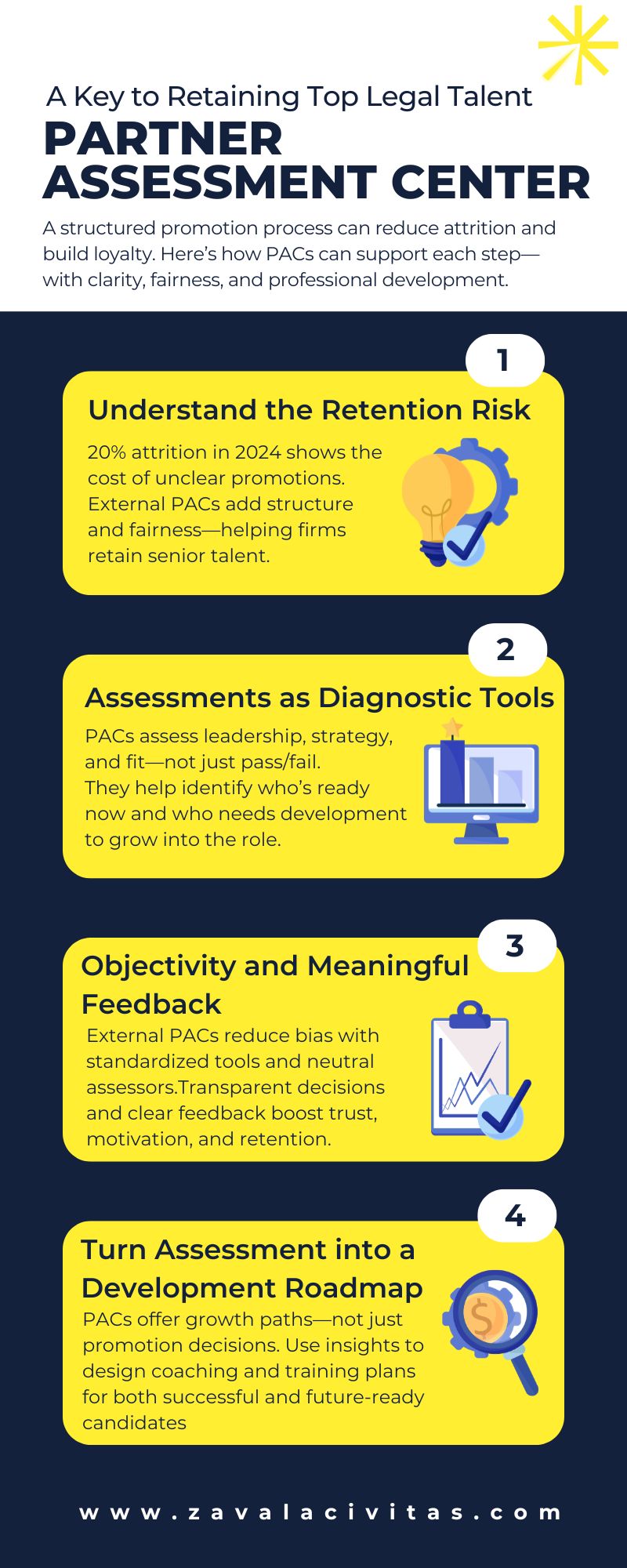Partner assessment centers for promotions are one of the most important processes in law firms. Both for the individuals under consideration and for the organization itself. Firms invest heavily in selecting the right candidates but often overlook a critical factor: the impact on those who are not promoted.
When this process lacks transparency or developmental follow-up, it can lead to dissatisfaction, disengagement, and ultimately, the loss of experienced senior lawyers.
Partner Assessment Centers (PACs) offer more than just a selection mechanism. They provide a structured framework that helps firms not only make better promotion decisions—but also the possibility of retaining and developing key talent for the future.
Partner Assessment Centers can be a helpful tool to address these challenges by providing greater clarity, fairness, and communication in the promotion process.
- Understand the Retention Risk
Unclear promotion outcomes can erode trust and morale. According to the NALP Foundation, the associate attrition rate in U.S. law firms reached 20% in 2024. While this is below the 2021 peak of 26%, it still represents a significant threat to knowledge continuity and client relationships.
A separate survey by Major, Lindsey & Africa found that 60% of associates felt their firms were not actively trying to retain them.
Partner Assessment Centers help address these challenges by providing greater clarity, fairness, and communication in the promotion process.
- Use Assessments as Diagnostic Tools
PACs go beyond a simple pass/fail outcome. They evaluate a wide range of competencies such as leadership, business acumen, strategic thinking and cultural alignment, providing a detailed snapshot of a candidate’s readiness for partnership.
This diagnostic approach allows firms to identify not only who is ready today, but who has potential to grow into the role, and what specific development areas to focus on.
- Ensure Objectivity, Transparency, and Meaningful Feedback
One of the main risks in traditional promotion processes is unconscious bias—whether based on personality, internal visibility, or personal relationships.
Partner Assessment Centers (PACs) help mitigate this by using standardized tools, multiple assessors, and evidence-based criteria. This makes the process more transparent, defensible, and equitable. Involving a third-party provider further enhances objectivity. External assessors bring neutrality, minimize internal politics, and ensure that feedback is focused solely on performance and potential.
The value of a PAC lies not only in its design, but in how results are communicated.
Clear, respectful feedback helps candidates understand decisions, identify development areas, and stay motivated.
When the process is transparent and feedback is constructive, candidates are far more likely to view the experience as a professional development opportunity—not a rejection. This reduces disengagement, promotes trust, and reinforces a culture of growth.
- Turn Assessment into a Development Roadmap
For those not promoted, a PAC should not be seen as a barrier—but as a foundation for growth. The insights generated through assessments—via simulations, structured interviews, and psychometric data—can be used to shape personalized development plans.
These may include tailored 1-to-1 coaching, high-visibility assignments, or internal mentorship designed to build readiness for future promotion rounds.
For instance, a senior associate who didn’t pass the PAC might receive a coaching plan focused on identifying improvement areas, such as business development.
Equally, those who are selected should also engage in structured development programs—to strengthen their leadership capabilities and ensure they succeed in their new role as partner from day one.
According to Citrin Cooperman, firms that invest in formal partner development programs report stronger retention and better succession outcomes.
The key is to position the assessment not as a verdict—but as the beginning of a structured leadership journey.

Conclusion
Partner Assessment Centers offer firms a chance to do more than select partners—they create a framework for fair evaluation, targeted development, and transparent communication.
Firms that approach promotion as a leadership journey—not a gatekeeping decision—are better positioned to build loyalty, increase diversity, and secure their future leadership bench.











